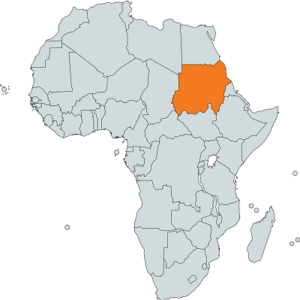Sudan
Background
 For the past 27 years, President Omar al-Bashir and a small group of ruling elites has transformed Sudan into a violent kleptocracy. This group, as well as their enablers and facilitators, have amassed personal fortunes by looting the country’s considerable natural resource wealth and state assets. Attempts to disrupt the looting machine or hold government officials accountable are met with state violence and severe repression.
For the past 27 years, President Omar al-Bashir and a small group of ruling elites has transformed Sudan into a violent kleptocracy. This group, as well as their enablers and facilitators, have amassed personal fortunes by looting the country’s considerable natural resource wealth and state assets. Attempts to disrupt the looting machine or hold government officials accountable are met with state violence and severe repression.
Armed conflict and mass atrocities drew the world’s attention to Darfur in 2003 and 2004. This conflict – which the United States government characterized as genocide in 2004 – resulted in the death of perhaps 300,000 people and the displacement of millions more. In 2009 the International Criminal Court issued a warrant for the arrest of Bashir, as well as several other government officials, and charged them with crimes against humanity. Prior to the conflict in Darfur, the Bashir government oversaw a bloody civil war between the North and South of Sudan. In 2005, combatants signed the Comprehensive Peace Agreement (CPA), which ended the Second Sudanese Civil War (1983–2005). The CPA also allowed a six-year period for the people of southern Sudan to determine whether they wished to remain part of Sudan. In 2011, Southern Sudan voted overwhelmingly to secede from Sudan, forming the independent country of South Sudan. That year also saw a new armed conflict emerge between the Government of Sudan and armed groups within South Kordofan and Blue Nile, two states bordering the new international border with South Sudan.
The secession of South Sudan caused a severe economic shock in Sudan, as the country lost nearly 75 percent of its oil reserves and 95 percent of its foreign currency reserves. Since 2011, the Sudanese government has continued to use severe repression and violence to neutralize political opposition and civil society, especially as the gross mismanagement of the country’s economy becomes a rallying point for protests and dissent. In 2017, Sudan remains mired by three active armed conflicts, a terrible human rights record, and recognition as one of the most corrupt countries in the world.
Recommendations
U.S. policy should aim to strengthen the hand of reformers in the civilian government while limiting the influence of the spoilers of reform and peace, principally those associated with the military and security services. To achieve these goals, economic and diplomatic pressures and incentives from the United States and the broader international community should be aimed at dismantling the violent kleptocratic elements that are still in place within Sudan’s kleptocratic system and that continue to threaten the success of Sudan’s transition. To that end, the U.S. government should undertake a more comprehensive and nuanced strategy than the approach it has pursued over the past 30 years, utilizing a combination of policy-based incentives and modernized financial pressures to support carefully benchmarked reforms. Additional information about The Enough Project’s policy recommendations for Sudan can be found here.

